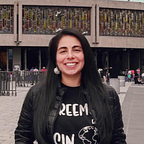¿Who are invading United States, Hispanics or Native Americans descendent?
By Yenny Delgado
On Saturday, August 3, 2019, at 10:30 AM at a Walmart Supercenter in El Paso, Texas, the United States suffered yet another terrorist attack in which 22 individuals were murdered and 24 were injured. The accused is a 21-year-old white man from just outside of Dallas, Texas. Before going on his terrorist rampage, he published a manifesto in which he stated: “I am against the Hispanic invasion.”
It is the first time in recent memory in which a white supremacist has opened fire and specifically targeted “Hispanics.” As we continue to process the grief, I think it is worthwhile to deconstruct some aspects of not only of the shooter’s ideology but that of the general culture in understanding the term Hispanic.
The term Hispanic, or Latino, is used a lot from describing the geographical area of the continent, and also as a way of discussing culture, music, and language. But the definition of Hispanic is that of a descendant of Spanish settlers in America and of Latino a person who speaks a language derived from Latin. Based on this definition are there still “Spanish” settlers invading the United States? In 2019, this certainly does not seem the case; however, it is critical to understand the basis for these misconceptions and reflect on the history of Europeans arriving on the continent.
From 1492 onwards not only the continent but its inhabitants would go on to take several different names. The native population was first mistakenly called Indians, by the geographical error of Columbus. Now the native population is often referred to as indigenous, native or first nations. The population of primarily African individuals who came to the America enslaved is called African American, the Asian population, is called Asian American, but the native population and their descendant who speak spanish are called “Latinos.” The terminology Latino is used to highlight the use of Spanish or Portuguese or other languages derived from Latin but also making it clear that Native Americans who spoke Spanish would be isolated from “Native Americans” in the United States and Canada. Finally, Europeans born in America who spoke English, mostly the population of the United States, decided to be called Americans without any prefix.
After 527 years of first being invaded, pillaged and then named by European, our continent, America, still has many wounds to heal. The sword wound is still latent in the native population and their descendants, who do not yet have recognition of being Americans, despite clear genetic and ancestral proof. Still today the descendants of Native Americans are one of the most demonized groups by the public and its leader.
Political leaders are a reflection of the people and their beliefs, an example is the president of the United States, Donald Trump, who during his campaign, repeated over and over again that those who live on the other side of the border only come to the United States illegally, they are rapists, criminals and animals.
“Some gang members who enter the country illegally are not people, but animals” Trump repeated at his meetings. He always received a lot of applause.
This description of non-Europeans as something less than human is not new. Trump and supporters of his rhetoric are only reflecting their earlier European ancestors who upon arriving in the continent weaved a fictional narrative that the natives were like “animals without a soul.” This dehumanizing first encounter would forever provide a basis for genocide, separation, and inhumane treatment.
What about the history of native populations and their descendants who have always been present in the United States?
The 2010 census data show 1% identify as Native American and 58.9 million, 20% of the US population, identifies as Latino or Hispanic of which about 30% is monolingual, that is, it speaks only English, a figure that according to studies is increasing.
Political leaders, Trump in particular and several of his followers who believe in the ideology of white supremacy seem convinced that America or at least the United States must not only speak English, it must also be white. The Texas attacker described in his manifesto “I don’t like mixed-race people” the “white race is superior”.
What do we face?
This new reality in our continent should move us to question the terms and labels that we have been using and repeating. The physical characteristic of what we call Hispanic or Latino, a person of average height, an oval face, a black hair, a brown skin shows the inheritance of resistance. The author of the massacre in Texas had by the description of who would be his target at the time of firing, and his manifesto makes clear that a “latino”population is an invader. This unfortunate event should make us wake up from what is happening on the continent. Free speech is one thing but clear hate speech which is punctuated with false ideology and encourages hatred towards those who are Native Americans, as well as their descendants should be rightly condemned and is not acceptable.
As native descendants we have the right, not only to exist but also to live without labels that dehumanize us and take away our rights as true Americans without the need to use Latino or Hispanic as a prefix. Now that the issue of identities and decolonization is so important, whether you speak Spanish, Portuguese, English, French or an ancestral language of the continent, will you dare to call yourself an American without a dash?
